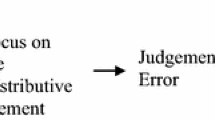Abstract
This article focuses on the effects of nonbinding recommendations on bargaining outcomes. Recommendations are theorized to have two effects: they can create a focal point for final bargaining positions, and they can decrease outcome uncertainty should dispute persist. While the focal point effect may lower dispute rates, the uncertainty reduction effect is predicted to do the opposite for risk-averse bargainers. Which of these effects dominates is of critical importance in the design of alternative dispute resolution (ADR) procedures, which are increasingly utilized in a variety of settings. We theoretically examine the effects of recommendations on the contract zone using a framework which allows bargainers’ final positions to influence a binding outcome should negotiations fail. This provides a more stringent test of focal points than previously considered. We also present data from controlled laboratory experiments consistent with our model. Recommendations are empirically shown to influence final bargaining positions and negotiated settlement values. In fact, recommendations significantly reduce dispute rates, even where they are completely ignored in final-stage arbitration. This highlights a potentially significant role for the use of nonbinding procedures, such as mediation, as a preliminary stage in more efficient ADR procedures.
Similar content being viewed by others
References
Ashenfelter O., Currie J., Farber H.S., Spiegel M. (1992) An experimental comparison of dispute rates in alternative arbitration systems. Econometrica 60(6): 1407–1433
Babcock L., Loewenstein G. (1997) Explaining bargaining impasse: The role of self-serving biases. Journal of Economic Perspectives 11(1): 109–126
Babcock L., Taylor L.J. (1996) The role of arbitrator uncertainty in negotiation impasses. Industrial Relations 35(4): 604–610
Bacharach M., Bernasconi M. (1997) The variable frame theory of focal points: An experimental study. Games and Economic Behavior 19: 1–45
Bolton G.E., Katok E. (1998) Reinterpreting arbitration’s narcotic effect: An experimental study of learning in repeated bargaining. Games and Economic Behavior 25: 1–33
Crampton P. (1992) Strategic delay in bargaining with two-sided uncertainty. Review of Economic Studies 59: 205–225
Crawford V. (1979) On compulsory arbitration schemes. Journal of Political Economy 87: 131–160
Crawford V. (1982) A theory of disagreement in bargaining. Econometrica 50(3): 607–637
Dickinson D.L. (2004a) A comparison of conventional, final-offer, and ‘combined’ arbitration for dispute resolution. Industrial and Labor Relations Review 57(2): 288–301
Dickinson, D. L. (2004b). Expectations and comparative arbitration institutions. Working paper, Appalachian State University, #04-12.
Dickinson D.L. (2005) Bargaining outcomes with double-offer arbitration. Experimental Economics 8(2): 146–166
Dickinson D.L. (2006) The chilling effect of optimism: The case of final-offer arbitration. The Journal of Socio-Economics 35: 17–30
Dickinson D.L. (2009) The effects of beliefs versus risk preferences on bargaining outcomes. Theory and Decision 66: 69–101
Dickinson D.L., Hunnicutt L. (2005) Does fact-finding promote settlement? Theory and a test. Economic Inquiry 43(2): 401–416
Farber H.S. (1980) An analysis of final-offer arbitration. The Journal of Conflict Resolution 24(4): 683–705
Farber H.S. (1981) Splitting-the-difference in interest arbitration. Industrial and Labor Relations Review 35(1): 70–77
Farber H.S., Bazerman M.H. (1987) Why is there disagreement in bargaining?. American Economic Review 77(2): 347–352
Farber H.S., Katz H.C. (1979) Interest arbitration, outcomes, and the incentive to bargain. Industrial and Labor Relations Review 33(1): 55–63
Hebdon R. (2001) Fact-finding effectiveness: Evidence from New York state. Industrial Relations 40(1): 73–82
Holt C.A., Laury S.K. (2002) Risk aversion and incentive effects. American Economic Review 92(5): 1644–1655
Janssen M.C.W. (2001) Rationalizing focal points. Theory and Decision 50: 119–148
Karper M.D. (1994) Fact finding in public employment: Promise or illusion, revisited. Journal of Collective Negotiations 23(4): 287–297
Roth A.E., Murnighan J.K., Schoumaker F. (1988) The deadline effect in bargaining: Some experimental evidence. American Economic Review 78(4): 806–823
Schelling T.C. (1957) Bargaining, communication and limited war. Journal of Conflict Resolution 1: 19–36
Schotter A. (2003) Decision making with naïve advice. American Economic Review 93(2): 196–201
Schotter A., Sopher B. (2007) Advice and behavior in intergenerational ultimatum games: An experimental approach. Games and Economic Behavior 58(2): 365–393
Stevens C.M. (1966) Is compulsory arbitration compatible with bargaining?. Industrial Relations 5(1): 38–52
Sugden R. (1995) A theory of focal points. The Economic Journal 105: 533–550
Tracy J. (1986) An investigation into the determinants of U.S. strike activity. American Economic Review 76: 423–436
Tracy J. (1987) An empirical test of an asymmetric information model of strikes. Journal of Labor Economics 5: 149–173
Tversky A., Kahneman D. (1974) Judgment under uncertainty: Heuristics and biases. Science 185: 1124–1130
Author information
Authors and Affiliations
Corresponding author
Rights and permissions
About this article
Cite this article
Dickinson, D.L., Hunnicutt, L. Nonbinding recommendations: the relative effects of focal points versus uncertainty reduction on bargaining outcomes. Theory Decis 69, 615–634 (2010). https://doi.org/10.1007/s11238-009-9156-0
Received:
Accepted:
Published:
Issue Date:
DOI: https://doi.org/10.1007/s11238-009-9156-0




